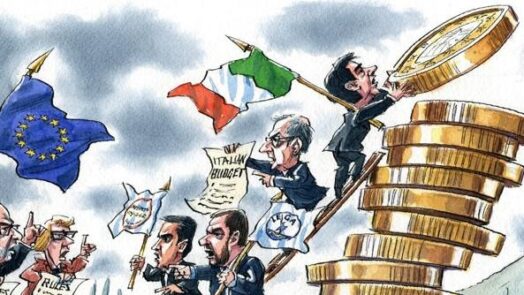Budget: Anxiety, Motivation, Control

When Marcelino Sanz de Sautuola, a Spanish amateurial archaeologist saw Maria, his 9 years old daughter disappearing behind a big red rock, trembled, but then when she cried: ” I found it!” his concern disappeared.
It was 1879 in Altamira where Maria found a cavern with the richest paintings of prehistoric age.
Our ancestors living there were a group of hunters. Finding, hunting and killing bisonts was their main objectives and scope but the task was risky, uncertain, unpredictable so painting on the cavern walls the images of what the hunt was expected to be, helped them in managing their anxiety. Grunting and patting each other in front of their objective was giving them the energy and motivation to go out in the open field and challenge those animals. Finally counting the beasts on the wall, they were able to fix their objective and check their achievement: at least 3 had to be killed to assure a month of food for their small tribe.
Sounds familiar: 35,000 years ago the key elements of Budget were defined. Anxiety to define a controllable outcome, Motivation to reach it and Control over achievements.
I do not know how tasks were separated in those prehistoric days but I am sure the CFO was in charge of painting on the walls the first Budget!
“Here is your objective!” I imagine him saying.
It took 100 years, after the cavern discovery, to Geert Hofstede, Professor Emeritus of Organizational Anthropology and International Management at Maastricht University in the Netherlands, well known for his pioneering research on cross-cultural groups and organizations, when debating and commenting about “The Game of Budget”, to refer at ancestral roots of one of the most utilized and debated process in nowadays corporations: the Budget. He inspired me in this article.
Hofstede was a master in recognizing that, in addition to national culture, it is certainly possible to argue that other constructs of culture exist. While still defining culture as “the collective programming of the mind that distinguishes the members of one group or category of people from another”, Hofstede (2001) introduces the concept of corporate culture as the cultural construct existing in corporations parallel to the national culture. Here he describes national cultures along six dimensions: Power Distance, Individualism, Uncertainty avoidance, Masculinity, Long Term Orientation, and Indulgence vs. restraint.
In this article, I will focus on Uncertainty avoidance that describes the extent to which members of a society try to avoid uncertainty and ambiguity (Hofstede, 2005). Uncertainty about the future is a basic fact of human life (Hofstede, 1980), but the central issue here are attitudes towards this uncertainty and how, and to what extent, people just let the future happen or try to control it (Hofstede, 2005).
After 35,000 year from the first prehistoric budget, the debate is open and much more recently, in 2013, two students of Stockholm School of Economics, –Bobo Delemark and Carl Axel List -, in their master thesis: “Budget processes and national culture – putting Hofstede to the test. An empirical case study of the Swedish and Russian sales organizations” followed Hofstede’s path and suggestions and analysed how the Budget is applied in different cultures. The students analyse the case of a Swedish multinational company with important presence in Russia.
The two students, analysing the way a corporation was applying the Budget process in different countries, tried to demonstrate how national culture and or local rules influence it.
I freely took from their excellent work to write this article and comment about the three key variables to be considered when dealing with Budget: Anxiety, Motivation and Control.
Anxiety
Using Hofstede terminology, Uncertainty about the future (Anxiety) is a basic fact of human life (Hofstede, 1980), but the central issue here are attitudes towards this uncertainty and how, and to what extent, people just let the future happen or try to control it (Hofstede, 2005). In countries with a high Uncertainty avoidance scores, rigid codes of belief and behaviour are created, and intolerance towards unorthodox behaviour and ideas are displayed. Weak Uncertainty avoidance societies on the other hand display relaxed attitudes and “practice counts more than principle” (Hofstede 2005).
The two students confirmed that, as in Hofsted model, “Russian associates have an extremely high Uncertainty avoidance score, illustrated for example by the fact that it has one of the most complex bureaucracies in the world. Detailed planning and briefing is also very common in most circumstances of Russian life (Hofstede Centre, 2013).
While Sweden has a low Uncertainty avoidance scoring: People in general believe that only few rules are necessary, schedules should be flexible and hard work is undertaken only when necessary for a specific reason (Hofstede Centre, 2013)”.
So let’s hear the Swedish HQ: “Make it Simple”
“In terms of budget philosophy, simplicity is the key word, HQ emphasises repeatedly when it comes to both budget planning and budget use” -the students report- “Einstein once said that everything should be made as simply as possible and that’s how we look at budgets. We continuously try to make the process simple, to avoid too much time being spent on it, and to avoid that the budget planning starts too early” (CEO & Co-founder/Owner). Moreover, the budgets for many sales divisions are essentially only revenue budgets with costs not calculated per se, but simply as figures being the result of unchanged margins and sales increases (fixed costs kept unchanged except for in cases of planned capital expenditures).
“I don’t really look too narrowly at all this, the important thing is that increase in sales is bigger than the increase in costs” (CEO & Co-founder/Owner). Another aspect that is highly emphasised is that a set budget is never changed. “It creates too much work and the benefits are only marginal” (CEO & Co-founder/Owner).
According to Hofstede, Sweden scores very low on another dimension: the Power distance. “Sweden is a country associated with independence, decentralised power and equal rights. Control is disliked and managers are informal, exemplified by the fact that addressing someone on a first name basis is accepted in almost all circumstances”. The student’s reports: “According to the CFO, “the vision is a major underlying idea that affects all budgeting”.
The Russians sees it differently
“Trying to keep things simple in a multinational company is however not entirely straight forward. “We try to streamline the process and we made some achievements in terms of the length of the process, but in terms of time used it’s still quite extensive. At the same time, I think that’s the only way it can be done” (Group Controller). An interviewed HQ member continues: “What is presented to the management is a one page document. On the surface it might look like something that takes 15 minutes to do but in fact it takes a lot of time”.
The Russian affiliates see it differently: “Budget is generally seen as very tough. ”I see colleagues that are miserable and have totally given up reaching the budget” (Branch Manager). A Sales Engineer describes how his branch has reached the budget goals only twice in the eight years he has been in the Group.
“In Russia things can be very unpredictable. It is important that the sales plan is realistic, otherwise we will lose motivation” (Sales Manager). Without forewarning, the government can for example suddenly change important tax rules. This means there are almost always cost deviations compared to budget targets” In Russia bonuses can reach up to 50% of the Sales Managers’ total compensation and it is distributed individually according to a set of rules. (While in Sweden only a small percentage is variable).
The broad lines of this somewhat complicated system is that if sales exceed 75% of the budget a small bonus is paid, which is then raised incrementally to a maximum of 100% of the base salary (i.e. bonus part = 50% of total compensation) if the revenue budget is exceeded. The bonuses are paid on a monthly basis, but can also be received retroactively if sales are uneven and sales in later months of the year. Higher degree of budget slack in Russia compared to in Sweden exists.
Lukka (1988) defines budget slack as deliberately created differences between the budgetees forecast about the future (“honest budget estimate”), and his or her submitted budget figure (budget proposal).
“From our research” – the students say – “we clearly note that budget slack is used to different extents within different parts of the Group; in Russia budget slack is frequently used in the budget to hedge against negative outcomes while in Sweden it is not. This is supported both by the claim that Branch Managers tend to be “overly pessimistic” made by the Russian Country Sales Manager, and by an interviewed HQ member who claims that the initial budget proposal he receives from the Russian sales division will always be overly pessimistic”.
The students find out that due to local cultural need to avoid Uncertainty and high Anxiety, on top of the impact of the variable salary component (i) budget setting starts earlier (and takes longer) in Russia than in Sweden, (ii) budget setting and budget use is more time consuming in Russia than in Sweden, (iii) costs receive more attention in Russia than in Sweden, and (iv) there is a higher degree of budget slack in Russia compared to in Sweden.
Control and Motivation
Finally, as an answer to the perhaps sometimes overlooked question of what is the actual purpose of using a budget, the CEO & Co-founder without hesitation answers: “It’s a tool that makes it simpler to control and follow up operations” (CEO & Co-founder/Owner). It should not be seen a forecast (even if is as a good source of information for creating a forecast), nor should it be seen as a tool to create motivational effects, according to the CEO & Co-founder/Owner.
What we can learn from this simple case when running Budget process in Multinationals Companies
Every beginning of the year, many Corporations across the world launch Budget Simplifications initiatives, that simplifications requires a big change management as Anxiety, Motivation and Control are lived and understood differently in different parts of the world. Moreover sometimes it is not easy to discuss openly about Uncertainty Avoidance (Anxiety) among managers that belong, despite being part of the same corporation, to very different cultures so fixing a common ground it is not at all easy. It is not the process reengineering that matters but the feelings, reward system, personal culture that matters. How fixing a target motivates people is another aspect with a lot of cultural biases. And the small example from the Student’s thesis tells a lot about it to all of us that try to improve the process every year since the last 35,000.
Despite being aware of the challenges, only very few companies dare to abandon the Budget process. The Beyond Budget initiatives in that direction receive small attention and support.
Trying to control the future via a forecast, a prediction and expectation is so intrinsic in our human nature that it is complicate to fix the problem.
Let’s hear the students: “These observations all follow the same pattern: they relate to the Uncertainty avoidance dimension of Hofstede’s model, meaning that, all other things equal, persons from high Uncertainty avoidance countries will try to control uncertainties related to the budget more extensively than what persons from low Uncertainty avoidance countries will. We argue that two main practical implications follow from this: (i) companies have to be aware of the strong effect individual countries’ degree of Uncertainty avoidance has on the budget process, and (ii) if companies want to make changes to the budget process on a global scale, they have to be aware that the ease of implementing these changes will depend on whether the changes go towards or away from the “preferred position” of that country determined by the degree of Uncertainty avoidance”.
The Russian country MD explains that if he sees that the budget isn’t going to be reached, he starts cutting costs. He explains that certain costs fall automatically with lower sales and that this is reinforced by the fact that bonuses make up a large part of employee compensation.
In Sweden on the other hand, overly tough budgets are usually simply accepted without any further questioning.





